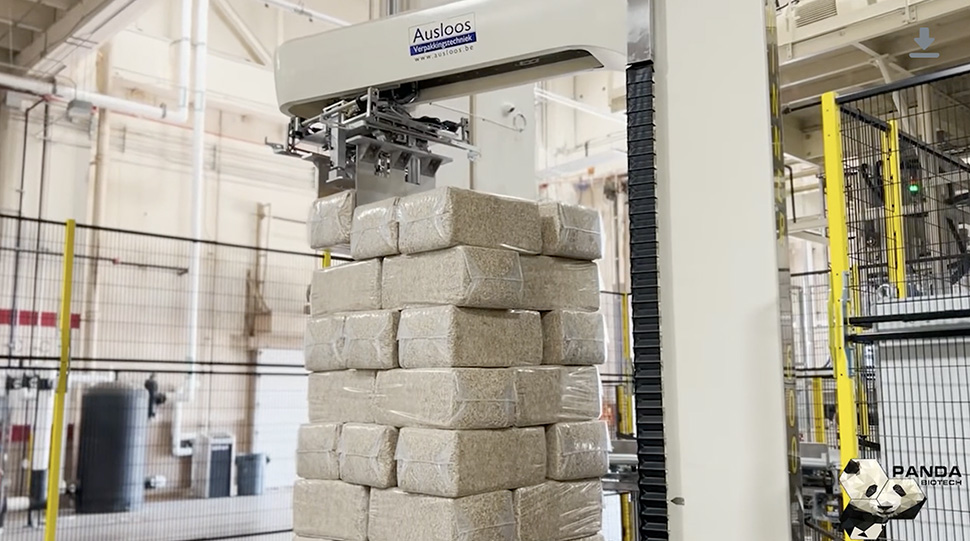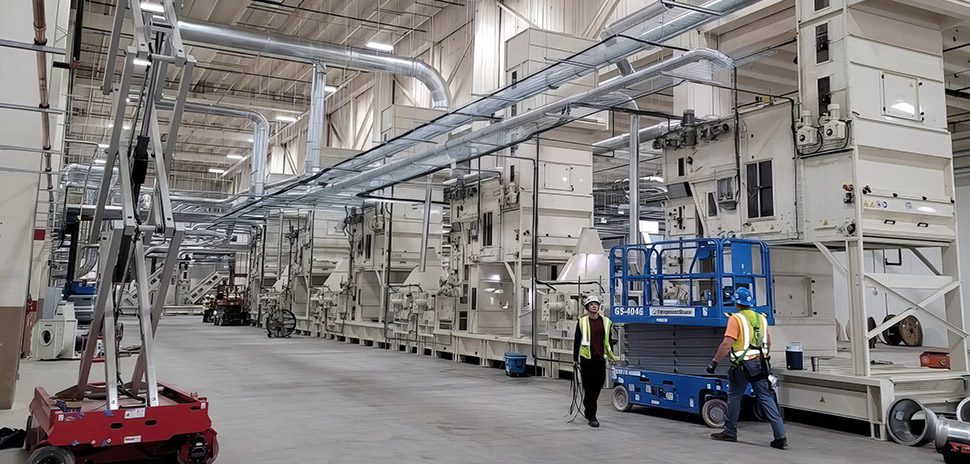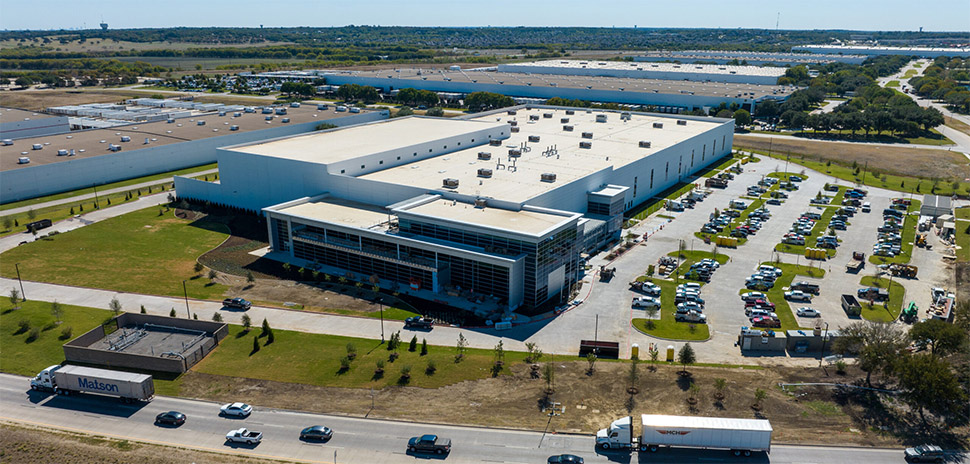Commercial operations have officially begun at the Panda Hemp Gin, a landmark industrial hemp processing facility in Wichita Falls, Dallas-based Panda Biotech announced.
The Panda Hemp Gin in Wichita Falls, a 500,000-square-foot building situated on 97 acres, is the first of its kind and the largest industrial hemp facility in the Western Hemisphere.
“Panda Biotech’s state-of-the-art industrial hemp processing facility is a monumental achievement and a game-changer for both agriculture and industry,” Panda Biotech President Dixie Carter said in a statement. “As research and development in this area continue to advance, industrial hemp fiber and cellulose will help transform numerous industries with sustainable goals and challenges. Panda’s industrial hemp will play a pivotal role in satisfying significant global market demand for renewable processes and products.”
Three miles of overhead duct lines
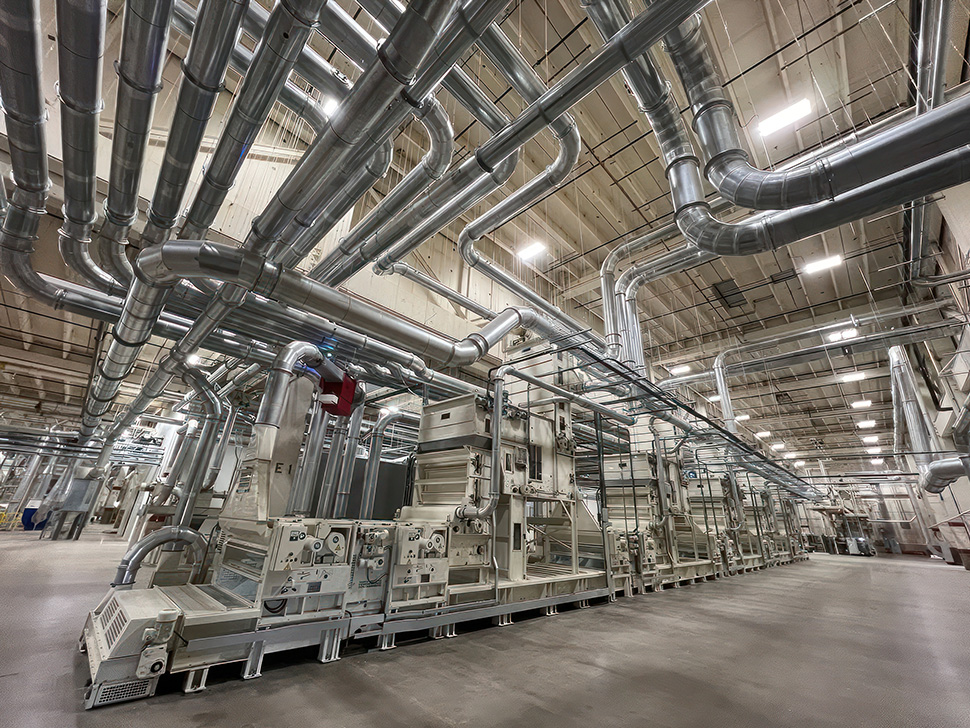
The newly opened Panda Hemp Gin in Wichita Falls. [Photo: Panda Biotech]
The facility has the capacity to process 10 metric tons of industrial hemp into textile-grade fiber, hurd, short-fiber/hurd mix, and nutrient-rich micronized hurd per hour. The company said it’s a zero-waste process, utilizing every part of the industrial hemp stalk, and operating solely on 100% renewable energy, making it “a paragon of sustainability” in the industry.
The Panda Hemp Gin’s production will continue to ramp up in the coming months, the company said.
The complex commissioning process of Panda’s 600-yard-long processing line and three miles of overhead pneumatic duct lines, including each piece of equipment for decortication, refining, blending, mechanical cottonization, hurd bagging and storage, and baling, was successfully completed in February, the company said.
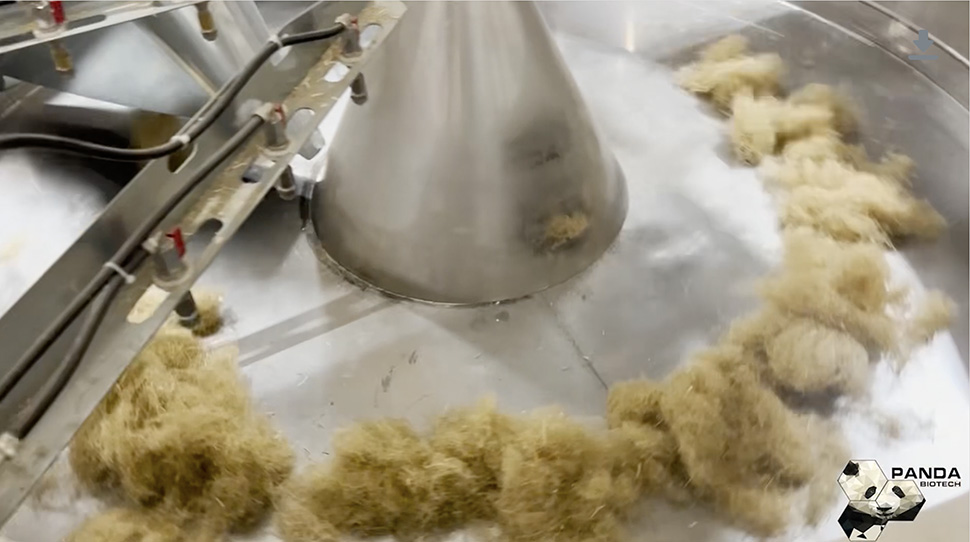
The newly opened Panda Hemp Gin in Wichita Falls. [Video still: Panda Biotech]
Hemp uses: from paper products to biofuel to insulation and more
Industrial hemp is considered one of the most versatile raw materials available with an unmatched variety of potential uses, Panda Biotech said.
The Panda Hemp Gin will focus on providing five main product lines from hemp, including mechanically cottonized fiber, decorticated fiber, hurd (cellulose), short-fiber/hurd mix, and nutrient-rich micronized hemp dust.
Panda Biotech said the applications for each product vary broadly from consumer and industrial textiles, non-wovens, paper products, bioplastics, biofuel, animal bedding, fiberglass substitute, construction materials such as hempcrete, mulch, insulation, and more.
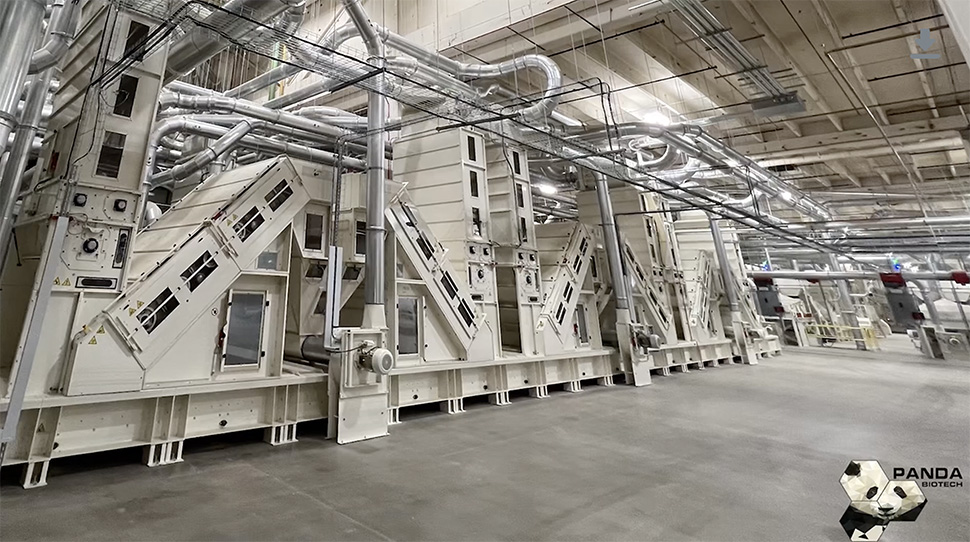
The newly opened Panda Hemp Gin in Wichita Falls. [Video still: Panda Biotech]
Partnering with American farmers
Panda said its partnership with the American farming community is at the heart of the operation.
Industrial hemp provides many benefits for producers, as it’s scientifically proven to minimize CO2 emissions, absorbing more per acre than any forest or commercial crop, Panda said.
Also, hemp requires significantly less water than most major crops, provides outstanding soil remediation, and requires minimal fertilizers, pesticides, and herbicides.
Panda said it is contracting with producers for its pay-to-grow program for this harvest and with farmers who may have straw or fiber from previous harvests or the 2024 growing season.
“The massive scale of the campus, allowing more than 22,000 pounds of baled hemp straw for processing per hour, is what makes this industrial hemp processing facility unique,” Panda Biotech Chief Operating Officer Scott Evans said in a statement. “Our straw is sourced directly from our farming partners in Texas and surrounding states, and, through our decortication process, it is transformed into packaged products, ready for retail or downstream manufacturing applications, within minutes. Panda’s processing equipment and infrastructure is truly best-in-class.”
Panda Biotech’s executive leadership has developed 22 projects representing approximately $12 billion in invested capital. Its first project, the Panda Hemp Gin, is in partnership with Aka-Ag LLC, a wholly-owned subsidiary of the Southern Ute Indian Tribe Growth Fund.
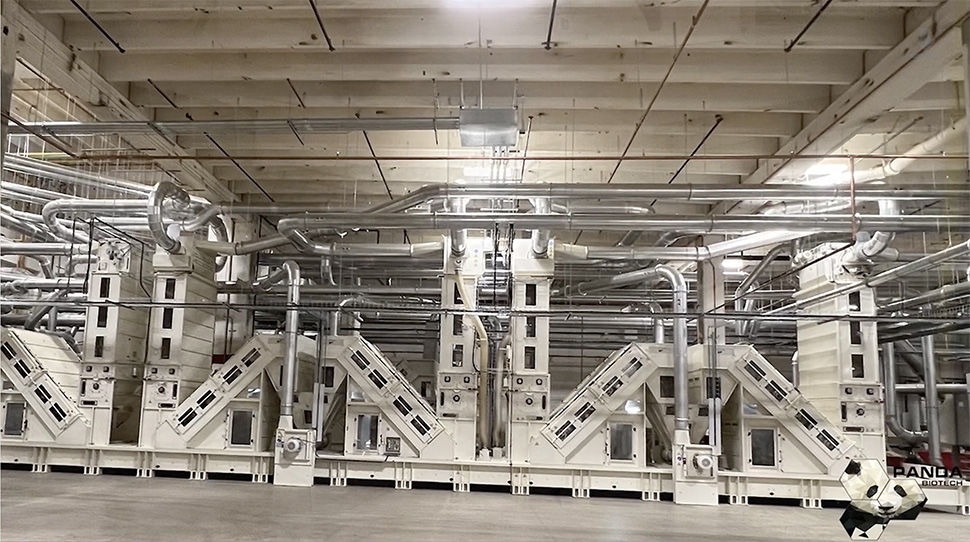
The newly opened Panda Hemp Gin in Wichita Falls. [Video still: Panda Biotech]
Hemp’s heyday and prohibition
Hemp’s journey from a long-standing agricultural asset dating back thousands of years to a misunderstood and legally prohibited plant, and now back to a crop heralded for its sustainability and versatility, is a fascinating account of agricultural and industrial history. The plants longstanding cultivation is well documented.
Hemp’s utility in clothing, paper, ropes, and sails has been pivotal throughout human history, as Panda Biotech notes on its website, with the Columbia History of the World noting the discovery of a piece of hemp fabric from around 8,000 BC as the oldest known relic of human industry. The plant’s fibers once made up to 90% of the world’s paper before 1883, including historically important documents like the Gutenberg and King James Bibles and the early drafts of the U.S. Declaration of Independence.
A prohibition era for hemp in the U.S. began in the 1930s with regulatory changes that conflated industrial hemp with psychoactive cannabis varieties, leading to the Marihuana Tax Act of 1937. That, coupled with the introduction of synthetic fibers and other political factors, led to a major decline in hemp production, despite a brief resurgence during World War II for the war effort, as highlighted in a “Hemp for Victory” campaign.
The 2014 Farm Bill was a turning point for the fiber, which allowed for state-regulated hemp research programs. Previous restrictions under the Controlled Substances Act of 1970 had lumped hemp together with other forms of cannabis without differentiation based on THC content, according to the National Agricultural Law Center.
‘The U.S. needs to catch up’
A Brookings report notes that the 2018 Farm Bill further solidified hemp’s legal status, removing it from the list of controlled substances and classifying it as an agricultural commodity with some restrictions, treating “hemp farmers like other farmers.” The legislation, supported by figures like Senate Majority Leader Mitch McConnell, distinguished hemp from other cannabis plants by its low THC content and opened the door for more widespread cultivation and research.
The legislative saga continues: In 2023 there was expectation for the introduction of a new Farm Bill—S.980 – Industrial Hemp Act of 2023—by the federal government that might clarify or close the regulatory gap concerning psychoactive hemp derivatives, an unintended consequence of the 2018 Farm Bill. But in November 2023, President Biden decided to extend the provisions of the 2018 Farm Bill until September 30, 2024.
While published reports on current and future market size projections vary, Panda has noted that industrial hemp will play a “leading role in monumental transformation of numerous industries such as farming, textiles, construction, paper and bio-plastics.” On its website, the company notes “almost everything that you can make with cotton, soy, flax or corn can be made with industrial hemp, but with significantly less impact on the Earth.”
Panda also said that “governments around the world have realized that this valuable crop is not a threat and have encouraged widespread planting of industrial hemp,” pointing to China’s global lead in hemp textiles and pioneering efforts in industrial applications in Europe. “The U.S. needs to catch up,” Panda added on its website.
![]()
Get on the list.
Dallas Innovates, every day.
Sign up to keep your eye on what’s new and next in Dallas-Fort Worth, every day.










